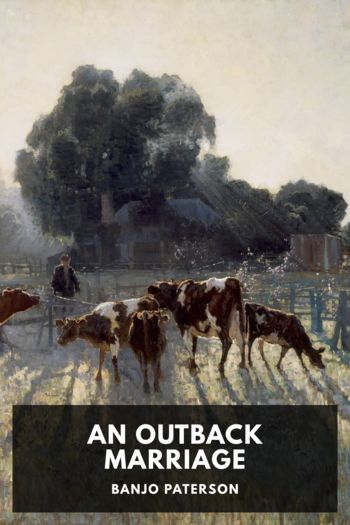The Little White Bird - J. M. Barrie (buy e reader .TXT) 📗

- Author: J. M. Barrie
Book online «The Little White Bird - J. M. Barrie (buy e reader .TXT) 📗». Author J. M. Barrie
I mentioned worldly ambition. “Good God!” he said with a shudder.
There was a clock hard by that struck the quarters, and one o’clock passed and two. What time is it now? Twenty past two. And now? It is still twenty past two.
I asked him about his relatives, and neither he nor she had any. “We have a friend—” he began and paused, and then rambled into a not very understandable story about a letter and a doll’s house and some unknown man who had bought one of his pictures, or was supposed to have done so, in a curiously clandestine manner. I could not quite follow the story.
“It is she who insists that it is always the same person,” he said. “She thinks he will make himself known to me if anything happens to her.” His voice suddenly went husky. “She told me,” he said, “if she died and I discovered him, to give him her love.”
At this we parted abruptly, as we did at intervals throughout the night, to drift together again presently. He tried to tell me of some things she had asked him to do should she not get over this, but what they were I know not, for they engulfed him at the first step. He would draw back from them as ill-omened things, and next moment he was going over them to himself like a child at lessons. A child! In that short year she had made him entirely dependent on her. It is ever thus with women: their first deliberate act is to make their husband helpless. There are few men happily married who can knock in a nail.
But it was not of this that I was thinking. I was wishing I had not degenerated so much.
Well, as you know, the little nursery governess did not die. At eighteen minutes to four we heard the rustle of David’s wings. He boasts about it to this day, and has the hour to a syllable as if the first thing he ever did was to look at the clock.
An oldish gentleman had opened the door and waved congratulations to my companion, who immediately butted at me, drove me against a wall, hesitated for a second with his head down as if in doubt whether to toss me, and then rushed away. I followed slowly. I shook him by the hand, but by this time he was haw-haw-hawing so abominably that a disgust of him swelled up within me, and with it a passionate desire to jeer once more at Mary A⸺.
“It is little she will care for you now,” I said to the fellow; “I know the sort of woman; her intellectuals (which are all she has to distinguish her from the brutes) are so imperfectly developed that she will be a crazy thing about that boy for the next three years. She has no longer occasion for you, my dear sir; you are like a picture painted out.”
But I question whether he heard me. I returned to my home. Home! As if one alone can build a nest. How often as I have ascended the stairs that lead to my lonely, sumptuous rooms, have I paused to listen to the hilarity of the servants below. That morning I could not rest: I wandered from chamber to chamber, followed by my great dog, and all were alike empty and desolate. I had nearly finished a cigar when I thought I heard a pebble strike the window, and looking out I saw David’s father standing beneath. I had told him that I lived in this street, and I suppose my lights had guided him to my window.
“I could not lie down,” he called up hoarsely, “until I heard your news. Is it all right?”
For a moment I failed to understand him. Then I said sourly: “Yes, all is right.”
“Both doing well?” he inquired.
“Both,” I answered, and all the time I was trying to shut the window. It was undoubtedly a kindly impulse that had brought him out, but I was nevertheless in a passion with him.
“Boy or girl?” persisted the dodderer with ungentlemanlike curiosity.
“Boy,” I said, very furiously.
“Splendid,” he called out, and I think he added something else, but by that time I had closed the window with a slam.
V The Fight for TimothyMary’s poor pretentious babe screamed continually, with a note of exultation in his din, as if he thought he was devoting himself to a life of pleasure, and often the last sound I heard as I got me out of the street was his haw-haw-haw, delivered triumphantly as if it were some entirely new thing, though he must have learned it like a parrot. I had not one tear for the woman, but Poor father, thought I; to know that every time your son is happy you are betrayed. Phew, a nauseous draught.
I have the acquaintance of a deliciously pretty girl, who





Comments (0)